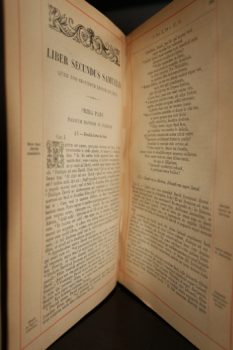Vulgate: The Latin Bible Posted by Brittany Britanniae on Jul 29, 2021 in Grammar, Latin Language
Today, we will be discussing and translating portions of the Vulgate, the Latin Bible.
While, I have a proclivity towards Classical Latin (c. 75 BCE to 3rd century CE) – I thought exploring Late Latin (c. 4th century CE to 6th century CE) and Medieval Latin (5th century to 15th century CE) would be appreciated.
Vulgate: What is it?
The Vulgate is a late-4th-century Latin translation of the Bible. It is still presently used in the Latin Church.
Vulgate: How did it come about?
The translation was largely the work of Jerome of Stridon who, in 382, had been commissioned by Pope Damasus I to revise the old Latin version used by the Roman Church. Once published, the new version became widely adopted.
Vulgate: Its longevity?
For over a thousand years ( 400–1530 CE), the Vulgate was the most commonly used edition of the most influential text in Western European society. Indeed, for most medieval (Western) Christians, it was the only version of the Bible ever encountered.
Until 1450, when Gutenberg printed this text, copies were also very rare and expensive. In the 14th and 15th centuries, the Bible was finally translated into modern languages, against great resistance from the Church. Finally in the mid-20th Century, the Roman Catholic church abandoned the use of Latin for liturgy.
However, this remains one of the most historically important Latin texts.
Translation
There have been several versions of the Vulgate, but the original one by Jerome of Stridon did include most books of the Bible we know today. However, there were some books of the Bible that were included that are not commonly included today.
It should be noted that the “readability” of the Vulgate was quite easy compared to other Latin texts because it had to be attainable by ALL people. The act of translating is quite simple compared to poetry, philosophy, and plays.
The Latin text presented here is based on the text of the 1598 Vulgate, which was used as the standard text of the Vulgate until 1979.
Vulgate: Genesis Chapter 1
- In principio creavit Deus cælum et terram.
- In the beginning God created the heaven(s) and the earth.
- Terra autem erat inanis et vacua, et tenebræ erant super faciem abyssi: et spiritus Dei ferebatur super aquas.
- Now the earth was formless and empty, darkness was over the surface of the deep, and the Spirit of God was hovering over the waters.
- Dixitque Deus: Fiat lux. Et facta est lux.
- And God said, “Let there be light,” and there was light.
- dixit+que = And, (God) said
- Fiat = Fiat is the jussive subjunctive form of the verb facio (to make, to build, sometimes to be).
- And God said, “Let there be light,” and there was light.
- Et vidit Deus lucem quod esset bona: et divisit lucem a tenebris.
- God saw that the light was good, and he separated the light from the darkness.
- esset = 3rd sg imperfect subjunctive -why?
- Literal translation: God saw that the light was (or, even more literally, “were”, subjunctive) good. The Vulgate has a mixed construction, with lucem as direct object of vidit and then an indirect-speech clause (which uses subjunctive): vidit Deus lucem quod esset bona, word for word, “God saw the light that it was good.”
- esset = 3rd sg imperfect subjunctive -why?
- God saw that the light was good, and he separated the light from the darkness.
- Appellavitque lucem Diem, et tenebras Noctem: factumque est vespere et mane, dies unus.
- God called the light “day,” and the darkness he called “night.” And there was evening, and there was morning—the first day.
- Dixit quoque Deus: Fiat firmamentum in medio aquarum: et dividat aquas ab aquis.
- And God said, “Let there be a vault between the waters to separate water from water.”
- Fiat = Fiat is the jussive subjunctive form of the verb facio (to make, to build, sometimes to be).
- And God said, “Let there be a vault between the waters to separate water from water.”
- Et fecit Deus firmamentum, divisitque aquas, quæ erant sub firmamento, ab his, quæ erant super firmamentum. Et factum est ita.
- So God made the vault and separated the waters those under the vault from those above it. And it was so.
- Vocavitque Deus firmamentum, Cælum: et factum est vespere et mane, dies secundus.
- God called the vault “sky.” And there was evening, and there was morning—the second day.
- Dixit vero Deus: Congregentur aquæ, quæ sub cælo sunt, in locum unum: et appareat arida. Et factum est ita.
- And God said, “Let the water under the sky be gathered to one place, and let dry ground appear.” And it was so.
- Congregentur – Subjunctive Jussive from congrego meaning to flock, gather
- And God said, “Let the water under the sky be gathered to one place, and let dry ground appear.” And it was so.
- Et vocavit Deus aridam Terram, congregationesque aquarum appellavit Maria. Et vidit Deus quod esset bonum.
- God called the dry ground “land,” and the gathered waters he called “seas.” And God saw that it was good.
- esset = 3rd sg imperfect subjunctive – see above example.
- God called the dry ground “land,” and the gathered waters he called “seas.” And God saw that it was good.
Well, those of the first ten lines of the Vulgate. If this was enjoyable, perhaps we will do more translating of this text later in the year closer to December.

Build vocabulary, practice pronunciation, and more with Transparent Language Online. Available anytime, anywhere, on any device.






Comments:
Joseph T Madawela:
thanks